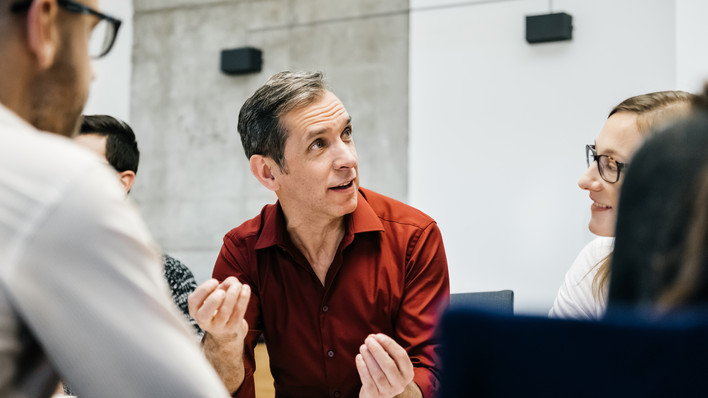If public speaking and the mere thought of presenting your ideas at work fills you with dread, you’re not alone. It’s the cause of sleepless nights for many of the most intelligent, creative and talented professionals all over the world.
The reason it’s such a global affliction is because many of us feel exposed and vulnerable. We know our topic but that doesn’t stop the stream of paralysing ‘what if’s’ that can flood our minds. Imagine how you may feel if you stopped seeing the presentation you’ve been called on to give as a curse, an inconvenience or a beauty parade. What if you saw it as an opportunity for growth?
Instead of retreating into fear and anxiety what if you saw it as a means of growing yourself personally and professionally. Just imagine the impact you could have if you used the presentation as a way of helping your audience grow too.
Whether you subscribe to Abraham Maslow’s ‘Hierarchy of Needs’ or prefer the more recent adaptation by the motivational speaker Tony Robbins, most of us would agree that human beings have certain basic needs.
According to Tony Robbins we each have 6 needs:
- The need for certainty/comfort
- The need for uncertainty/variety
- The need for significance
- The need for love and connection
- The need for growth
- The need to contribute
Each time we stand to speak many of our needs are challenged and can therefore become the source of great anxiety. Whether you are the presenter or sitting in the audience the impact can be significant.
1. The need for certainty/comfort
Your audience need to be certain that the moment you begin speaking they will know they are in the right room and be glad they came. They need to be clear that you will be respecting and valuing their time and not wasting a moment of it.
The very fact that every presenter is aware of this crucial premise places them under enormous pressure to deliver. It’s all well and good knowing what your audience need but if you’re not certain you can deliver that’s another matter entirely.
As presenter’s we can spend a vast amount of time crafting what we believe is the most stimulating and effective presentation but how can we be certain that:
They will like me?
They don’t know more than I do?
They will agree with me?
They won’t ask me questions I don’t know the answer to?
The fact is we can’t be certain about any of these issues.
That said, if we invest sufficient time, energy and focus on crafting a presentation designed exclusively to help our audience whatever happens we get to grow to.
If for whatever reason they didn’t like you, agree with you or even knew more than you then you get to find out as much as you can which will serve you well next time.
What if someone actually had the audacity to ask you a question you didn’t know the answer to; you get to be certain that you will know it the next time around.
If you set out with the mind-set to make every presentation you craft and deliver better than the previous one you are on a course for growth.
2. The need for uncertainty/variety
I’ve never met anyone who looks forward to attending a business presentation; unless their own job is so boring that they’d do anything to escape it or the biscuits are so nice. Let’s face it; generally speaking it’s the same people sitting in the same seats saying the same thing each month in largely the same way. Your audience are desperate for you to challenge the status quo and to shake things up a little. They need some drama, contrast, humour and stories.
In other words they need something different.
For many presenters this can be the scariest and most complex part of presenting. The presenter needs to feel certain that all will go well and that there will be no surprises. Their audience also want to feel certain that all will go well too but they want something different; they want to be surprised.
Our job as presenters is to start with the end in mind which revolves around building and delivering a presentation that stands out from the crowd for all of the right reasons.
There is a great deal of power in channelling that energy of uncertainty to launch a platform of growth for both us and our audience.
3. The need for significance
Your audience are the most important people in the room and it’s every presenter’s job to make them feel that way.
As presenters however, many of us hold a perception that there is a great deal at stake that could severely tarnish our own sense of significance. After all, if our credibility or reputation is at risk of being compromised in any way our self –esteem can receive quite blow
We all want to look good, impress our audience and elevate our standing and position in the organisation but our real challenge is to make our audience feel significant.
Remember, we are already daunted by the backdrop of so much uncertainty that when we set out to also fulfil our need for significance the continued uncertainty can be very frightening. If we switch our focus to making absolutely everything we say, show and do about our audience rather than ourselves we strengthen our capacity for mutual growth.
4. The need for love and connection
Relax, your audience aren’t waiting for you to shower them with hugs and kisses but be very clear that they do want you to connect with them. They have already entrusted you with their valuable time and data isn’t all they want in return.
The idea that we want colleagues and clients to love us at work may be a stretch for many people but the thought of connecting isn’t. At Mindful Presenter we hold the very strong belief that ‘Connecting is everything.’ You will see it on our website and hear it repeatedly in our presentation training courses and public speaking coaching sessions.
It’s an absolute given in business presenting that your audience will want you to give them the facts, data and evidence. It’s also true however that they don’t want you to dump all of that information on them in an emotionless vacuum. They want you to connect with them emotionally as well as intellectually; they want you to help them to feel something.
If you don’t connect with your audience you can be certain that they are unlikely to remember most of what you said and will have created your own path to feeling insignificant.
It all starts with setting a very clear intention at the outset.
How do you want your audience to feel the moment you finish speaking?
I can’t think of a more effective way of achieving growth than connecting with our audience.
5. The need for growth
As you have already worked out for yourself this is an article about growth.
There is really only one thing your audience really want from you; it’s to help them to grow.
They need you to help them grow intellectually, professional and emotionally.
Why else would they sit quietly listening to you for 20 minutes when there is a whole host of other more important things they could be doing with their time.
How will what you have to say help your audience to grow in some way?
If it doesn’t then perhaps you may need to rethink your content, message or the medium you have chosen to share the information you have. In our quest to help our audience grow we get to grow too.
Presenting isn’t easy by any stretch of the imagination but if we reframe it as an opportunity for growth everything changes.
6. The need to contribute
Allied impeccably to our human need to grow is our need to contribute.
From your audiences perspective remember they have plenty of other things they could be doing. If they are going to sit patiently listening to you for any length of time they need you to contribute something that will make a tangible difference to their professional or personal lives. By the same token most audiences are only too keen to contribute to a mindful presentation which challenges their thinking and offers them real value.
Instead of dreading giving a presentation see it as an opportunity that you have to contribute something to your audience that will benefit them, make a difference and help them grow. Give them the opportunity to make their own contribution to what you have to say too.
Developing our public speaking and presentation skills offers each of us an exciting vehicle for growth.
Are we vulnerable?
Are we exposed?
Is there risk?
The answer to each of these questions is a definite yes although you can be certain that in the absence of these fears there can be little growth.
Image: Courtesy of shutterstock.com
This article originally appeared in Mindful Presenter.
This article was written by Maurice DeCastro from Business2Community and was legally licensed through the NewsCred publisher network. Please direct all licensing questions to legal@newscred.com.
![]()



